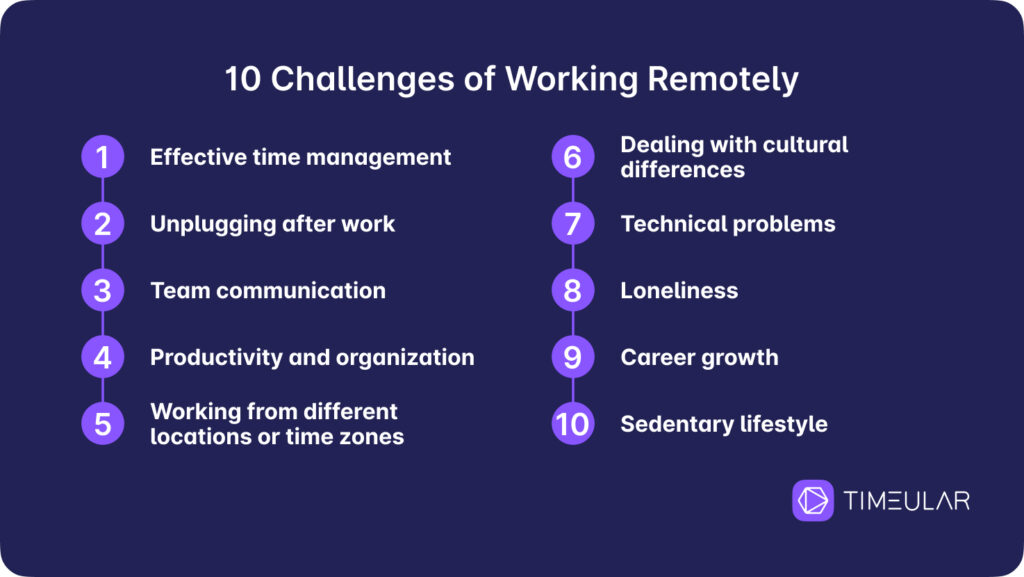Utmaningarna med att arbeta på distans
Remote and hybrid working aren’t just temporary trends – they’re here to stay. Sure, skipping the commute, avoiding office distractions, and having more personal time are great perks. In Timeular, we work 100% remotely, and we appreciate all of the benefits.
But, as with anything, there are common remote work challenges, too. Managing your own time and staying productive can be tough. Want to learn more? Let’s dive into ten of the biggest challenges of working remotely that I have encountered during several years of working remotely.

The 10 challenges of working remotely
Disclaimer: Personally, I am a big fan of remote work. It allows me to travel, plan workation, adjust my schedule and live a flexible life. However, it wouldn’t be fair to claim that there are only benefits of remote work. I do stumble upon remote work challenges from time to time, too. Here are the most common remote work pitfalls I’ve experienced so far:
1. Effective time management
Working remotely means that you can work from wherever you want. Thus, you may have several distractions if your remote work is from home. Whether it’s the dishes, the laundry, cleaning the bedroom, or even caring for your children. It can be a little too much sometimes, making it hard to focus.
There are also other time wasters at work: social media, checking websites, watching TV, etc. Yet, if you find it hard to concentrate, consider using a time-tracking app. Understanding where your time is going will help you keep on track and build a work schedule for yourself.
Rekommenderad läsning:
- Best remote time tracking software for employees
- How to improve focus
- Bästa apparna för tidshantering

Get your free copy and discover how to leverage the power of time tracking in remote teams
2. Unplugging after work for better work life balance
There’s a common misconception that remote workers are slackers. On the contrary, overworking is one of the biggest challenges of working remotely.
According to Buffer’s 2019 State of Remote Work report, 22% of remote workers have experienced difficulties in balancing work and life even when they’re not leading remote teams.
With no need to spend time commuting from the office to your home, it can be hard to separate your professional life from your personal life. You might feel guilty that your manager might think you’re not working more since you’re off-site, so you try to overcompensate to appear busy.
If you have difficulty detaching, try the following strategies:
- Ask for help from the people close to you. Ask your partner, family members, or friend to keep you accountable and remind you it’s time to unplug.
- Start tracking your time. Time tracking helps to realize how much time you spent at work every single day. I strongly recommend automated time tracking but you can also use free timesheet templates to track time manually.
- Also, make sure you take breaks throughout the day. Set reminders to get away from your desk for a few minutes, to take rest and improve productivity.
Läs mer om detta:
- Work habits that will help you hack your day.

3. Team communication with remote team members
Effective communication is also one of the main challenges of managing remote employees. Since you’re not physically in the office with your colleagues, you will miss impromptu lunches, coffees, team meetings or spontaneous talks.
It makes it harder for remote workers to create more profound and meaningful connections with team members and feel integrated into the team.
There are a lot of tools to manage remote employees that will help you to address communication gaps. Using a project management tool is crucial for managing projects and facilitating team communication. Companies use collaboration tools like Skype, Teams, or Slack, where everyone, remote and in-office, can chat about anything.
Regular video calls with your team and manager are also an excellent way to bond with remote teams. Having good relationships with your colleagues is extremely important for your well-being at work.
To avoid this issue, read our article about improving team communication.
4. Productivity and organization
Without someone overlooking your work, you need to be a master at self-motivation and time management to work efficiently. It’s always difficult to stick to a schedule and get all the tasks done. But this gets even harder for remote workers.
Managing your to-dos can be challenging when you work from home and have such a flexible routine and so many distractions.
An organized schedule is critical to staying productive. Prepare a to-do list, create a time management plan, and use the time blocking method to manage every second better!
Break your daily to-do list into chunks of time to work on tasks or projects and manage your time. Using project management tools can help track progress and manage tasks effectively. If time blocking doesn’t work for you, apply other top time management techniques.

Start tracking time with your remote team to maximize their potential
5. Working from different locations or time zones
With remote working, many companies have the opportunity to hire people from all around the world, which is excellent for business. But it’s not always easy to manage.
Remote team members face challenges with time zone differences and maintaining synchronization. With people working in different time zones, it’s harder to have the team in sync.
Time zone differences make real-time collaboration and communication difficult or even impossible. Also, it can easily lead to overworking if you’re not careful.
When you work remotely, it’s not uncommon to be waking up as a teammate is signing off.
This doesn’t have to be a problem! If you’re a manager and your team is in this position, make sure you create a few guidelines for everyone to follow.
Flexibility is critical in this type of situation. Make sure your team members who don’t work during the usual company hours have regular schedules and always work at the same time.
This way, everyone knows exactly when they’ll be available, making communication a lot easier. Default to asynchronous communication as it’s the best way for distributed teams to collaborate across time zones. If everyone knows not to expect an answer immediately, it reduces the pressure to be “on-call” 24/7.

6. Dealing with cultural differences
Besides the time zone, working remotely with people from around the world can result in many other challenges for virtual teams. You’ll also have various languages and cultural backgrounds coming together on projects.
Also, workplace expectations can be widely different between countries. For instance, you’re expected to work long hours in some countries, while in others, an 8-hour workday is a standard.
However, some cultural differences can be very delicate, such as differences in religious beliefs. These must be respected, including religious holidays that may require time off or participation, such as Ramadan.
To avoid potential issues, encourage open dialogue in your team about culture, religion, politics, etc. Promote tolerance and understanding across all topics to ensure everyone feels comfortable.
7. Technical problems
I’m sure this has happened to you more than once. Even though technical problems can occur both at the office and at home, at least you know that your IT team will be able to help you if you’re at the office.
If you’re not tech-savvy, make sure that when you request your company’s technical team to check your system frequently to avoid inevitable technical challenges. And, do not forget of adopting the top remote work apps and tools.

8. Loneliness
This is one of the biggest challenges of working remotely for employees and managers.
Many remote workers deal with loneliness in and out of the remote work context, especially after the pandemic. Regardless of what origins it is, loneliness can have a super strong influence on your health and job satisfaction.
Besides the personal impact it has on people, loneliness also significantly damages companies and businesses. If your workers feel lonely, they’ll feel less engaged, less productive, and less motivated. According to Buffer, 24% of remote employees struggle with feelings of loneliness.
Physical presence in an office offers spontaneous moments that allow you to interact with others. When working remotely, it’s is not that easy. There are no hallway conversations or having coffee with colleagues. Remote workers need to be more proactive and often look outside work for their social interaction.
As a manager, it’s imperative to create space for their workers to connect and create relations. Here are a few tips on how to help:
- Have a Team Engagement Manager or someone who actively checks on people and creates surveys to see how engaged everyone is.
- Bring your team together or create groups where people can discuss current challenges and share their successes.
- Encourage employees to make regular quick calls with their team members to talk about non-work topics like TV shows, pets, books, etc.
As a worker, if you’re company culture is not focused much on helping you out, try to find your own thing! Here are some of my suggestions:
- If you cannot interact with your team members, get your interaction outside of work! Have lunch with your family and friends and hang out more with them during the day.
- When possible, work remotely outside of your house. Many co-working spaces, coffee shops, libraries, and other places will make you feel less alone.
- As you’re not spending time in traffic going to the office, you have much more accessible time! Make plans after work and invite family and friends for dinner.
- Call your colleagues for quick informal chats to discuss things unrelated to work. It will make you feel great!
9. Career growth
It’s particularly challenging to have any career advancement when you work from home as you’re less visible.
The truth is that most managers lack experience managing people who work remotely. Also, many executives still don’t love the idea of remote working, claiming that people work less at home than at the office. This is one of the reasons why some managers don’t like remote working.
Nonetheless, learning, development, and mentorship are not impossible to achieve remotely. You have to be more proactive and take control of your career.
- Be your advocate: Learn to communicate your worth to your manager by writing monthly updates, for example, or proactively progress updates on Slack, Teams, or whatever platform you use.
- Share with your manager your career goals: It’ll help your manager greatly if they know where you want to go. Talk to your manager about the skills you want to develop so they can give you more appropriate projects.
- Look for new opportunities within the company: If there’s an exciting new project that you’re interested in or you’d like to help others with their projects, be the first to put your hand up to take it on.
- Be proactive with communication: Remote work makes informal conversations harder. Be someone who documents everything so current, and new employees can get up to speed quickly and feel much more included.
10. Sedentary lifestyle
Working from home can lead you to a more sedentary lifestyle and slip into bad habits. Although it’s harder to stay active for motivation reasons, you can become healthier if you change your mindset.
Here are a few tips:
- Have restricted sleeping hours. Being at home doesn’t mean it’s Saturday every day. Make sure you go to bed early, so you don’t feel tired during the day.
- Get outside and go for a walk; it will help you feel more relaxed and help with vitamin D.
- Exercise often: invest in a home gym, join a group fitness class, or check some YouTube workout videos.
Slutsats
Here is my list of the 10 biggest struggles you can have whilst working remotely. Remote work can be very rewarding if you can handle these common issues. Perhaps you’ll have also more time for a life outside of work with friends and family.
You must make remote working work for you. Thankfully, remote working can bring a lot of benefits to your life. Find what works better for you and stay organized. Discipline is vital to achieving that perfect work-life balance.
VANLIGA FRÅGOR
Why is remote work stressful?
Remote work is not always the right choice. It might be stressful for you if you struggle to balance your work and personal life. Another challenges of remote work is the lack of communication – remote working sounds great but if you don’t get to see and talk to your team members openly, it will cause stress.
What are the problems with working remotely?
One of the main remote work challenges is loneliness, proper communication, balancing work and personal life, and effective time management.
What is the difference between working remotely and working from home?
Working remotely is a broader term than working from home. Remote teams can be distributed all around the world – such a company culture allows you to travel or attend conferences when working. Working from home suggests that you are based in one place. Although there are some distinctions between those two terms, remote work and working from home are often used interchangeably.
Du kanske är intresserad av: